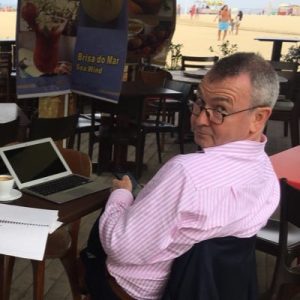|

Hello from London.
By Patrick Lane, Senior Digital Editor, The Economist
In one sense, anniversaries don’t matter very much. The day exactly, say, five, 13 or 27 years after some event, however important it was at the time, is just another day. And yet they do matter, a lot. Though they are just accidents of the calendar, anniversaries—whether of birth, marriage or death; of war breaking out or guns falling silent—are focal moments, to celebrate, mourn or simply reflect.
Next Saturday brings a very unhappy anniversary: the second since Vladimir Putin’s Russia began its full-scale invasion of Ukraine. To many of those fighting and suffering in Ukraine, it will, I suspect, be just another grim day; and with the fall of Avdiivka this weekend, the news is getting no better. But it’s also a moment for those in the West, especially in Europe, to take stock, not only of the misery and bravery of Ukrainians but also of the nature of Russia under Mr Putin. And the need for that has been sharpened by three other events, two shocking but not surprising, the other long planned—all reflected in our coverage in recent days, with more to come in the week ahead.
One of those shocking events came on Friday, with reports that Alexei Navalny, Russia’s most prominent opposition leader, had died in an Arctic penal colony. The precise circumstances remain murky, but as we wrote, “Whatever ends up on his death certificate, he was killed by Vladimir Putin.” His authority as a fearless critic of Mr Putin, even returning to Russia in 2021 after the dictator’s goons had failed to kill him with poison, will be hard, if not impossible, to replace. Several other opposition figures are either dead or in prison. Mr Putin’s repressive grip seems tighter than ever.
The other was a remark by Donald Trump, America’s once-and-would-be president. He said last weekend that he had once told a leader of another NATO country that if it had failed to meet the alliance’s target for defence spending of 2% of GDP, he would not come to its aid if Russia attacked it. “In fact, I would encourage them [ie, Russia] to do whatever the hell they want.”
Admittedly, you never know whether Mr Trump means what he says. But his influence on pusillanimous congressional Republicans who are blocking aid to Ukraine is already clear. European NATO countries, several of which fall short of the 2% target, would do well to take note, and spend more. In fairness, they are: three-fifths will hit the target this year. But Europe is still a long way from being able to defend itself unaided against a Russian attack, should it ever come.
Which brings us to the third event: the annual Munich Security Conference, which has been taking place this weekend, and where NATO’s, and especially Europe’s, preparedness for war has been at the forefront of attendees’ minds. Today we have published an analysis from Munich of Europe’s defences and the efforts to build them up. Though spending and production are rising, Europeans are far, far away from being able to defend themselves without American help.
As you’d expect, Russia and Ukraine are far from the only things on our minds. If you haven’t yet read our cover leader, on the rise around the world of “national conservatism”—the “Global Anti-Globalist Alliance”—I recommend it. On a related note, do explore the Italian hard right’s fascination with the hobbits, orcs and elves of J.R.R. Tolkien, in 1843 magazine. And on a wholly unrelated one, we’ve also published today a story examining why the world’s mining companies, which were splashing the cash freely not long ago, have stopped investing, and why that’s a problem for the green transition.
Finally: in case you’re wondering what’s happened to Adam Roberts, who usually writes this newsletter, he’s taking a break this weekend. He’ll be back next Sunday. |



